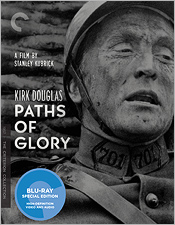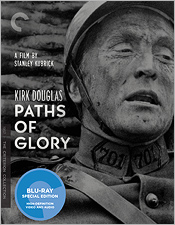Paths of Glory (Blu-ray Review)

Director
Stanley KubrickRelease Date(s)
1957 (October 26, 2010)Studio(s)
MGM/United Artists (Criterion - Spine #538)- Film/Program Grade: A-
- Video Grade: B+
- Audio Grade: B
- Extras Grade: B+
Review
Stanley Kubrick’s 1957 Paths of Glory may have lost a measure of its resonance with age, but it still ranks among the best films of its genre, depicting the full range of human reactions in the midst of war: greed, fear, cowardice, bravery, honor.
The film takes place in France during WWI. An order is handed down by the French High Command, that a particularly difficult German position (called “The Anthill”) must be taken immediately and at all costs. The commanding officer of the solders tasked to do it, General Mireau (George Macready), at first resists the idea, knowing that without reinforcements his troop losses will be overwhelming. But when the right incentive is applied – a little flattery and a significant promotion – the General’s reluctance evaporates. So the order is handed down to the regiment commander who will actually lead the attack, Colonel Dax (played by Kirk Douglas). Dax immediately recognizes the folly of the assault, but bravely leads his men into the line of fire, where most are cut to pieces. Due to the cowardice of one of his Lieutenants, however, some of his men never leave the trenches. General Mireau furiously decides that the attack failed because Dax’s men have “milk running through their veins.” Three of them are chosen at random, regardless of their actions during the assault, and are placed on trial for cowardice and mutiny – a charge which carries the death penalty. So Dax, a lawyer before the war, must defend his men on a volatile battlefield of a different sort – a military kangaroo court.
Paths of Glory is just a damn good film. Kubrick’s script (co-written by Jim Thompson and Calder Willingham, based on a book by Humphrey Cobb), raises questions of morality and human nature without ever seeming heavy-handed. The story could easily have become a standard courtroom drama, but instead focuses more on the actions (and reactions) of the men on trial. And while this isn’t Saving Private Ryan, the realism Kubrick and cinematographer Georg Krause manage to evoke during the battle sequence is completely believable – quite a feat considering the film was made without the use of today’s digital effects. Douglas simply excels in his role, delivering one of the best lines of dialogue of his long career with vein-popping venom. And the film’s ending manages to restore just the right measure of hope, to both Dax and the viewer.
Presented in its original 1.66:1 aspect ratio (with slight vertical black bars on either side of the frame), Criterion’s Blu-ray presentation of Paths of Glory is delicate and nuanced, with soft and refined shadings and satisfying image detail. Contrast is exceptional in the black and white image, with deep blacks and wonderfully detailed shadows. The brightest areas of the image are never overblown, and a subtle texture of grain preserves an excellent cinematic viewing experience. The film’s audio is presented in the original mono, in uncompressed LPCM format. Sonic clarity is excellent, with clear dialogue. Music and sound effects are well layered in the mix. For a vintage mono track, it sounds quite good – natural and pleasing to the ear, matching the visuals as well.
The extras included here are certainly typical for a Criterion release, but they’re also far more than one might ever have expected Paths of Glory would see. Included is a new feature-length audio commentary with film critic Gary Giddins, an excerpt from a 1966 audio interview with Kubrick, a 1979 TV interview with Douglas, new interviews with Kubrick’s longtime producer Jan Harlan, the film’s original producer, James B. Harris and Kubrick’s wife, Christiane, a French TV segment on the original WWI events that (at least in part) inspired the film, and the film’s theatrical trailer in HD. You also get a 10-page booklet with photos, credits and liner notes by film historian James Naremore.
Paths of Glory remains both powerful and poignant despite its age. It’s one of Stanley Kubrick’s better films, and it’s certainly one of his most conventional. It’s also never looked and sounded so good outside of a theatre. We can only hope that Criterion gets a shot at more of Kubrick’s films in the future. Perhaps The Killing or Killer’s Kiss? Highly recommended.
Additional Notes

